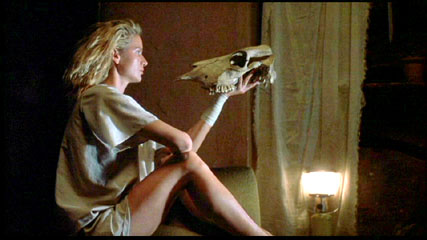| My God - it's Last Tango in Barstow. | |
|
Warm Summer Rain is one of the strangest films ever made in America with mainstream actors. Although it features Hollywood performers, there is plenty of graphic sex and some frontal nudity, and an ambitious aspiration to strip aside the superficial and petty ways in which we normally communicate and thence to dig deep inside the human psyche to find out what we really want from life. It seems like one of those arty meditations on the nature of life from one of the great Italian directors. If Antonioni had come to America to make a movie in 1989 instead of 1970, he would have made something like this instead of Zabriskie Point. If Bertolucci had decided to do his "isolated lovemaking as an outlet for despair" movie in an adobe house instead of in a Paris apartment, he might have made something like this instead of Last Tango. Perhaps I have taken too lofty a tone. While it is entirely appropriate to compare Warm Summer Rain to Antonioni and Bertolucci in terms of themes and attitudes, I don't mean to equate this production with the work of those masters. It is more accurately pictured as an uneasy hybrid between the artistic aspirations of Italian arthouse cinema and the steamy execution of 80s-style softcore erotica. The picture to the right sums up just how unstable that compound can be. |
 |
|
"Alas, poor Elsie. I knew her, Horatio. A cow of most infinite milk" |
|
|
In the opening scene, a woman tries to commit suicide. The next few minutes show the thoughts that go through her head as she is being rushed to medical care, and the following montage shows her obvious repulsion at the annoying people who come to commiserate at her bedside. One day she just decides to skip out of the hospital. Wearing nothing but her hospital gown, flip-flips, and an overcoat, she walks out of the hospital and into the nearest bus station where she points to a direction and asks for a ticket to someplace over there. Before arriving at wherever she was headed, she persuades the bus driver to drop her off in the middle of the desert, where she wanders around for a while in her sandals and hospital gown, her wrists still bandaged from her suicide attempt. Her peregrinations eventually take her to a dusty run-down roadhouse where she proceeds to get falling down drunk and starts stumbling around in an improvised dance with a five-legged iguana. Cut to the next morning, when she wakes up in an abandoned house, lying beside a man, wearing his wedding ring. This is where the film begins in earnest. In the next hour, the man and woman exist in a two person world in which they rip away at one another's superficial defenses and establish some kind of deep, sexual communication while trapped in a single isolated location. In these encounters, Lynch uses the raw sexual and emotional contact as therapy for her grief. Here you can see the close parallel to Last Tango in Paris, in which Brando was isolated with a single woman within an apartment, using sexual contact as therapy for his own grief. The Last Tango parallel can be extended still further, to a scene where the man bathes Lynch tenderly, to another scene where the lovers try unsuccessfully to have a normal sort of day in the outside world. I wouldn't recommend watching this with the kids. It was rated R in the 80s, but those were the 80s. It would be NC-17 today. There is some pretty wild sex and a vast amount of nudity, with both male and female genitalia making occasional appearances. Some of the nudity is combined with raw dialogue. It plays out the way Who's Afraid of Virginia Woolf might have gone if George and Martha were young strangers who were sexually hungry for one another. Here's a "for instance" - at one point the couple is locked in a 69 position, staring at each other's genitals, and they improvise a competition in which each must describe the other's genitals with one word or short phrase, taking turns until one of them cannot think of a new term, or until one of them uses a term which is successfully challenged by the other. "Cock. Pussy. Dick. Cunt. Peter. Beaver." And so forth. Unlike the other movies I have compared it to, Warm Summer Rain has a fairly hopeful, almost corny ending, at least for one of the characters. After all is said and done, the film is not going for arthouse despair. It marches to the beat of its own drummer, choosing to be neither an arty work of existentialism nor a conventional piece of erotica. Sometimes it functions fairly well as one or the other, but there are other times when it seems to fail at both. It is not an especially good movie (rated below 5 at IMDb), but I admired its personal, quirky attitude. Even when it fails, it does so in daring, offbeat ways that can make one nostalgic for a time when filmmaking was not as safe and formulaic as it seems to be in 2005. |
|
